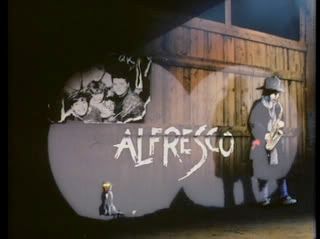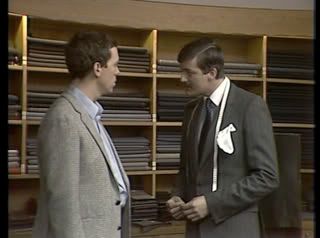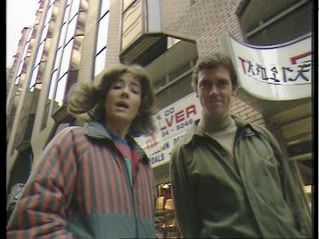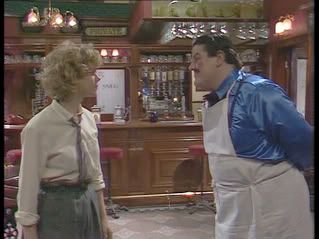

|
 |
Alfresco
R2 - United Kingdom - Network Review written by and copyright: Paul Lewis (30th January 2009). |
|
The Show
 
During the 1980s, the format of the sketch show developed something of a renaissance, and became associated with the work of the ‘alternative’ comedians (such as Ben Elton and Rik Mayall); even the BBC’s ‘alternative’ situation comedy The Young Ones (1982-4) adopted a structure dominated by surreal whimsy and which could be likened as much to the defining structures of the sketch show as to those of the sitcom. In 1980, BBC2 broadcast the first ‘alternative’ sketch show, Boom Boom... Out Go the Lights; this series marked the first collaboration between some of the key figures behind the development of The Young Ones. In the same year that The Young Ones appeared on the BBC, the newly-formed Channel 4 began to broadcast their own series of one-off vehicles for the alternative comics, The Comic Strip Presents… (1982-8). The alternative comedy scene was driven mostly by comedians from working-class backgrounds who had been to either redbrick universities or polytechnic colleges (Rik Mayall, Alexei Sayle, Nigel Planer, Ben Elton). However, at the time the British comedy scene was also dominated by the ‘Oxbridge’ comedians, many of whom were associated with Cambridge University’s Footlights Dramatic Club. Founded in 1883, the Cambridge Footlights began as an attempt to provide vaudeville to the inhabitants of Cambridgeshire; over the years, the Footlights had introduced a number of comedians and satirists who had become a part of the comedy ‘establishment’ (Peter Cook, John Cleese, David Frost, Graeme Garden). There was conflict between the Footlights and the alternative comedians; some of the alternative comics labelled the Footlights as elitist, and the Footlights found that their spotlight had been stolen by the new breed of media savvy alternative comedians (Jones, 2001: np). In an article for The Guardian, David Stubbs notes that at the time, ‘It was thought that the rise of alternative comedy might put an end to the Oxbridge domination of Britcom’ (2009: en). Stubbs points to an episode of The Young Ones, ‘Bambi’, in which the students of Scumbag College (the titular ‘young ones’) are pitted against the Oxbridge-esque Toffs on University Challenge. Stubbs suggests that this episode, in which ‘the housemates go up against the Toffs on University Challenge, with Ade Edmondson's Vyvyan putting a Dr Marten boot through the floor showering the Toffs in plaster, could be seen as symbolic of this punkish shift. The irony is that the Toffs were played by Stephen Fry, Emma Thompson and Hugh Laurie, all Footlights stock, and all about to embark on more fabulously successful careers than any of the Scumbag College team’ (ibid.). However, despite their very different social backgrounds there was never a simple dualistic relationship between the alternative comedians and the Cambridge Footlights crew; the two groups of comedians would often work together on shows such as Blackadder (BBC, 1983-9). 
During the burgeoning years of the alternative comedy scene, Granada put together this sketch show that married some of the bright lights of alternative comedy (Ben Elton, Robbie Coltrane) with comedians who had graduated from the Cambridge Footlights brigade (Stephen Fry, Hugh Laurie, Emma Thompson). Perhaps surprisingly, the result is mostly satisfying, the show marrying the surreal and anarchic humour of the alternative comedians with the sharp satirical observations that Stephen Fry and Hugh Laurie would sharpen in their later BBC series A Bit of Fry and Laurie (1989-95): in his biography of Stephen Fry for the BFI’s ScreenOnline website, Graham Rinaldi observes that ‘[f]alling somewhere between the satirical comedy of the 1960s and the outspoken anti-Thatcherism of the 1980s, [Fry and Laurie] set their sights on the tweedy and well-spoken world of Middle England’ (Rinaldi, 2005: np). A curious hybrid of the surreal anti-establishment satire associated with the alternative comics and the wordplay and cultural observations that dominated the later series A Bit of Fry and Laurie, Alfresco was, in Emma Thompson’s words, an attempt ‘to play down our Footlights past’ (quoted in Nickson, 1997: 41). Certainly, as with much alternative comedy the humour in Alfresco grows naturally out of the characters rather than being delivered as a ‘punchline’ at the end of the sketch, as per more traditional sketch shows such as The Two Ronnies (BBC, 1971-87). 
Indirectly, Alfresco grew out of the Cambridge Footlights revue show of 1981. At the Edinburgh festival of that year, the Footlights show was awarded the Perrier Award and, hoping to capitalise on its success, ITV commissioned a short sketch-based series titled There’s Nothing to Worry About! (1982) (Rinaldi, op cit.). (There’s Nothing to Worry About! is included as an ‘extra’ on the first disc of this DVD release of Alfresco.) There’s Nothing to Worry About! lasted only three episodes, but developed into Alfresco, which ran for two series; both shows were originally conceived as ITV’s attempt to ape the success of the BBC’s Not the Nine O’Clock News (1979-82). Alfresco acquired its name from ‘the decision to shoot much of the material outside the studio, using handheld video equipment that until then had been the province of news crews’ (Duguid, 2005: np). The show certainly has a fast and loose visual style that is facilitated by its use of real locations rather than studio-shot footage, although the comedy itself is more steadily-paced and far less anarchic than the alternative comedy shows that were appearing on British television at around the same time. The best sketches tend to satirise British culture, including a great sketch (reworked from a sketch in There’s Nothing to Worry About!) satirising the type of hyper-aggressive and leary ‘lad’ culture that later became dominant during the 1990s, and some observations about manners (Hugh Laurie offers a pregnant Emma Thompson a seat at a bus stop, asking her ‘Would you like a seat?’, only to be met with a declaration of ‘No I wouldn’t, you patronising little blinder’). However, on the whole the sketches in the second series tend to be weaker than those in the first, including the highly self-reflexive bridging device introduced in the second series, the ‘Pretend Pub’. Nevertheless, within the sketch show format there is always a ratio of ‘hits’ to ‘misses’, and for fans of this era of British television comedy the number of sketches that could be labelled ‘hits’ is more than sufficient to justify the purchase of this DVD set. Disc One: Series One Extras: three episodes of There’s Nothing to Worry About! Disc Two: Series Two
Video
Shot on video, the series looks as good as a shot-on-video comedy series of this vintage should do. There is a little wear and tear on the tapes and some visual distortion that is facilitated by the shot-on-video format, which is to be expected, but nothing too major. 
The series is presented in its original 1.33:1 screen ratio.
Audio
Audio is mostly clear, with one or two very minor moments of distortion throughout the thirteen episodes that make up the two series of Alfresco; there is nothing serious enough to impair a viewer’s enjoyment of this series. There are no subtitles.
Extras
The full three episodes of Alfresco’s forerunner, There’s Nothing to Worry About!, are included on disc one. This show is at least the equal of Alfresco.
Overall
Alfresco is a funny show; this DVD release is highly welcome. The inclusion of There’s Nothing to Worry About! makes this DVD recommended for fans of 1980s British television comedy, especially fans of Ben Elton or Stephen Fry and Hugh Laurie. References: Duguid, Mark, 2005: ‘Alfresco, 1983-4’. ScreenOnline. [Available Online.] Jones, Chris, 2001: ‘Cambridge Footlights: Living With a Legacy’. BBC. [Available Online.] Nickson, Chris, 1997: Emma: The Many Facets of Emma Thompson. Taylor Publications Rinaldi, Graham, 2005: ‘Fry, Stephen (1957- ) Biography’. ScreenOnline. [Available Online.] Stubbs, David, 2009: ‘University of Laughs’. The Guardian (31 January, 2009). For more information, please visit the homepage of Network DVD.
|
|||||

|